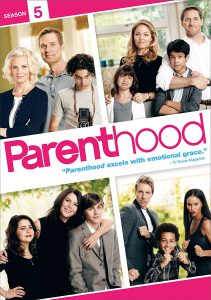Mainstream TV dramas, most of which are produced in statist Hollywood, are still far from libertarian-leaning. But “Parenthood,” which as recently as last fall had Jasmine talking about how good she felt voting for Obama in 2008 (without any follow-up about her thoughts on his performance as president), is bucking the trend with a storyline that launched last week. Frustrated with Max being squeezed out of the education system (he’s too Aspergery for public school, too normal for special schools), Kristina is looking into starting her own school.
As people who watched the 2012 film “Won’t Back Down” know, Kristina will face an uphill battle with bureaucracy. Admittedly, that movie was about parents taking over a public school, using a law that allows such a thing (if parents are willing to navigate the extremely antagonistic bureaucracy) when a school is really, really god-awful bad for decades on end. That’s not what’s going to happen on “Parenthood,” because it seems like Kristina wants to start a charter school for Max and the autistic daughter of a woman she met on her political campaign, and perhaps other similar students. In many states, charter schools need government approval before they can open (and future check-ups to stay open; and all of this says nothing about the real-world business challenges that public schools don’t have to face). Parents who homeschool their children sometimes face similar battles. (In “Won’t Back Down,” Maggie Gyllenhaal’s character lost out in the lottery drawing to get her daughter into the local charter school.)
I can already see this storyline unfolding, with Bob Little, who defeated Kristina in the Berkeley mayoral election, trying to shut down Kristina’s school. I have hope that “Parenthood” will do it justice, though, even as it hits the expected beats. The series has a history of skimming over some things (we haven’t heard much about Adam and Kristina’s financial troubles lately; in fact, it sometimes seems they’ve forgotten about Haddie and all the tuition money that fled eastward). Yet it does other things quite well. There used to be moments when Max’s blow-ups made “Parenthood’s” portrayal of Asperger’s seem too melodramatic, but the addition of adult Aspie Hank (wonderfully played by Ray Romano) has provided a fuller picture of the condition both for viewers and for Max (he sees that someone like him can succeed professionally). Aspies are becoming more common on TV (Sonya on “The Bridge” is another good one), and “Parenthood” unquestionably does the best job of portraying them.
Additionally, I hope this upcoming storyline will be an uplifting yet accurate portrayal of citizens doing something good on their own, while chronicling the indefensible intrusions of government they have to overcome. “Parenthood” has already portrayed politics fairly well by showing how professional slimeball Bob Little went negative in order to defeat Kristina, but also by showing how Kristina’s honesty and openness about her son’s condition played well with enough voters that the election was at least close.
Quite possibly, “Parenthood” isn’t even trying to be political with the “Won’t Back Down” riff. Perhaps it’s just trying to portray a good cross-section of issues that parents might face in 2014, and one of those issues is trying to get your kid a good education.

As a youth, I faced a similar situation to Max in that I didn’t fit in at any school. (My mom tells me I was quiet for long periods, in contrast to Max’s explosions of anger.) I remember spending one trial day at a private (religious) school. I’m not sure how we ever thought that would work; how does a socially challenged atheist go to a religious school and not have it be a problem? I remember that the private school was much the same as the public school. Neither government nor free-market education served my precise needs. It worked out OK in the long run. Now, for what it’s worth, I can advocate for the benefits that come from a competing marketplace of schools and tell today’s kids that life gets better, not worse, after school.
After all, education is not only an Asperger’s issue, and “Parenthood” has done a decent job of portraying painful school experiences in general. It nicely captured the no-win scenario of Joel and Julia debating whether to hold slow-learner Victor back from fifth-grade and keep him in fourth. As unfortunately can happen on a show with something like 20 characters, the writers haven’t really followed up on Victor’s story. But to some degree, the parents’ stressful debate over what to do with Victor led to their current breakup (the most manipulative, melodramatic storyline currently on the show. That having been said: C’mon, Joel, give her another chance!).
So maybe Jason Katims and his writing team aren’t trying to make an explicit political stance. But if a well-written mainstream TV show like “Parenthood” openly advocates for school choice and maintains acceptable ratings and ad revenue, who knows? It could start a snowball effect of liberty being popular in TV fiction, and regardless of the original motive, that’s a good thing.

